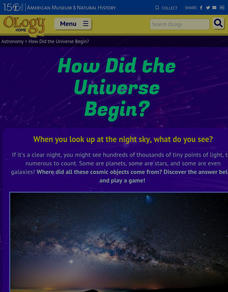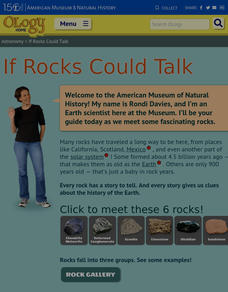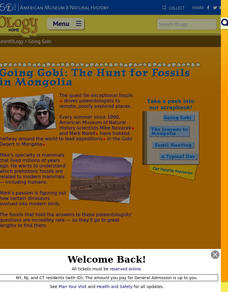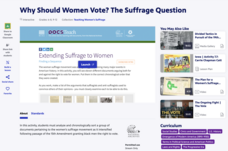American Museum of Natural History
How Did the Universe Begin?
The Big Bang Theory is more than a television show. Pupils read how Edwin Hubble observed other galaxies and noticed that the galaxies are moving away from each other. Scholars learn about the idea of the big bang and what happened next...
American Museum of Natural History
If Rocks Could Talk
Meet some interesting rocks. Learners discover information about the three types of rocks and different rocks that are within each group. They read imaginary interviews with six rocks as each rock tells the story of their formation and a...
American Museum of Natural History
Moon Flip Book
Flip over the phases of the moon. Using an interactive, pupils view the location of the moon relative to the sun and earth for the eight major phases of the moon. Individuals record how the moon looks through a complete cycle. Using...
American Museum of Natural History
Meet the Universe's Main Attraction ... Gravity
Learners read a short description about gravity and what it does and then explore the two ideas about how gravity works. After gaining a better understanding of the concept, individuals participate in a thorough experiment on what would...
American Museum of Natural History
Layer of Time
Dig through the layers for a better understanding of fossils. Scholars learn that fossils form in layers of sedimentary rock. Pupils arrange virtual layers to show the fossil record of different species. Once the layers are correct, they...
American Museum of Natural History
Identification Adventure
Put all the pieces together. After a skeleton is put together, pupils play the scientist to determine the type of animal they have by using a classification tree to narrow down the identity. After each decision, they gain advice from an...
American Museum of Natural History
Going Gobi: The Hunt for Fossils in Mongolia
Take a trip on a fossil hunt. Pupils read about a trip to the Gobi Desert by a group of paleontologists to find fossils. Learners view pictures taken on the trip and determine what the scientists go through in the search for answers to...
American Museum of Natural History
The Milky Way Galaxy
Just how big is the galaxy? Learners read information about the size of the Milky Way galaxy to better comprehend its size. Pupils develop an understanding of the number of stars in the galaxy by finding just how big a billion is and...
American Museum of Natural History
What Do You Know About Astronomy
Develop an understanding of the universe. Learners answer 10 multiple choice questions about several topics in astronomy. Questions contain information about the age of the universe, gravitational attraction, galaxies, planets and comets...
American Museum of Natural History
What Do You Know About the Universe?
The universe is full of a mystic matter people cannot see. Pupils respond to 10 questions about the stuff in the universe. Most of the questions involve the big bang theory and dark matter. Learners find out how astronomers have found...
University of Victoria
Agreement with Indefinite Pronouns
Why can't they agree? Scholars learn about agreement with indefinite pronouns with online materials. First they learn what indefinite pronouns are as well as examples. They look at examples of indefinite pronouns used in sentences before...
Constitutional Rights Foundation
Global Warming and the Paris Agreement
Global warming: a political debate or a scientific fact? Young historians read text, complete activities, and participate in group discussion to understand the political debate surrounding global warming and the US decision to withdraw...
Constitutional Rights Foundation
Automation and the American Worker
A thought-provoking resource examines the future of automation and the effects on employment. Academics read informational text, complete written prompts, and participate in activities to understand automation and the possibilities for...
Arcademics
Penguin Hop
It's a race to learn the state capitals. Using a multi-player video game, participants hop from iceberg to iceberg as penguins in response to questions about state capitals. The real-time practice lets both teacher and learner assess...
Arcademics
Country Toad
Hop from country to country to practice knowledge of international capitals using an interactive video game. Pupils take control of frog avatars and direct them to leap from the name of a capital to its home country. The video game...
Yale University
inspireED Innovator's Guide
Educators and scholars come together to build a team of go-getters striving for positive change in their school and community. Become an insipreED team with this handy guide designed to get you started. Sixty pages outline the who, what,...
Arcademics
Toad Hop
Hop-scotch your way across the world to help improve class members' skill and accuracy in identifying capital cities. By using a frog avatar, learners leap to the correct country for each capital city as it flashes up on the screen....
Arcademics
Capital Penguin
Hop across the country like a penguin from ice floe to ice floe using an interactive video game. Acting as a penguin, learners match capitals to their states. Game features allow teachers to set up competitions and check learning progress.
American Museum of Natural History
What is Astronomy?
Go study the universe. Pupils learn seven aspects about astronomy and astronomers. They begin to learn about constellations; distance and motion between objects; gravity; the electromagnetic spectrum; dark matter and energy; and teams of...
American Museum of Natural History
What's the Big Deal About Paleontology?
Paleontologists could be considered detectives of the past. A quick online lesson describes the science of paleontology and the importance of fossils. Young scientists read about how paleontologists analyze the features of fossils to...
Thoughtful Learning
Using Perspective Shifting to Persuade Readers
One of the key competencies of social and emotional learning is social awareness and being able to see things from another's perspective. This ability to shift perspective is particularly important when crafting an argument to persuade...
PBS
Why Should Women Vote? The Suffrage Question
An online interactive activity asks learners to analyze a group of documents related to the women's suffrage movement and then place the documents on a timeline. The results assess users understanding of the progression of the women's...
PBS
19th Amendment to the U.S. Constitution - Women's Right to Vote (1920) and Resource Materials
A facsimile of the 19th Amendment, a transcript of the amendment, a photograph of a suffragist march, and a background information sheet that details the struggle to get the amendment passed comprise a packet of resource materials...
University of California
Breathing Boards
Instill the importance of mindfulness with six breathing exercises. Scholars trace shapes using their fingers, following arrows that tell them when to breathe in and when to breathe out. Exercises increase by counts of breath in and out.

























